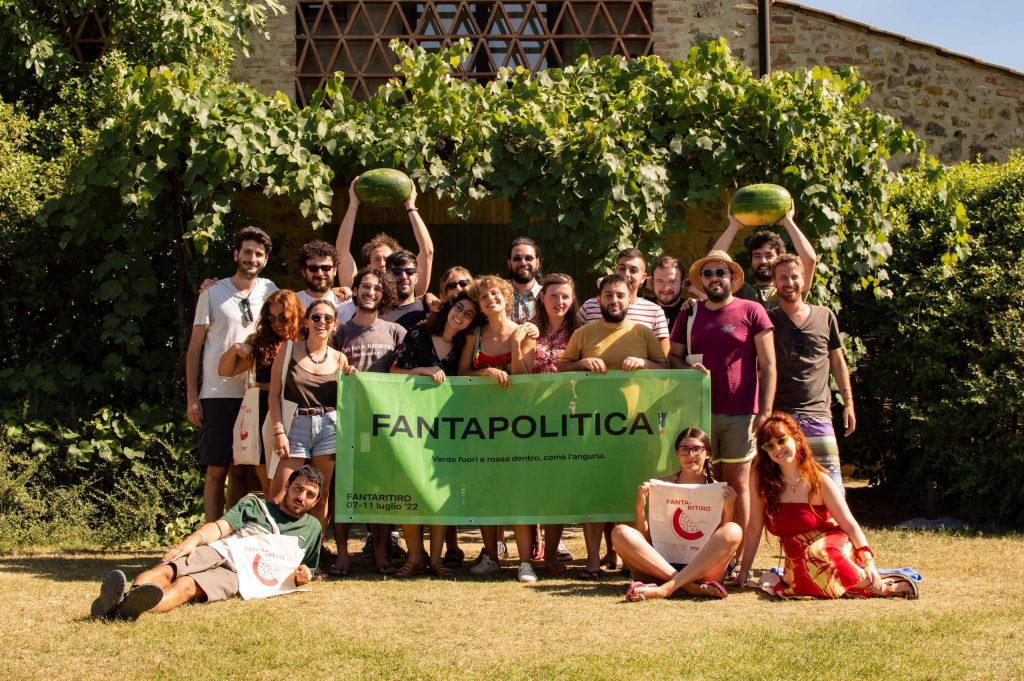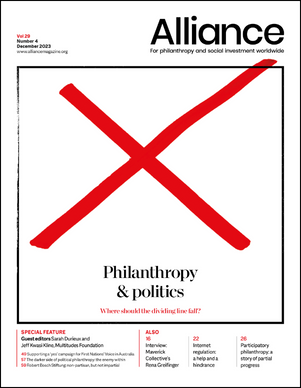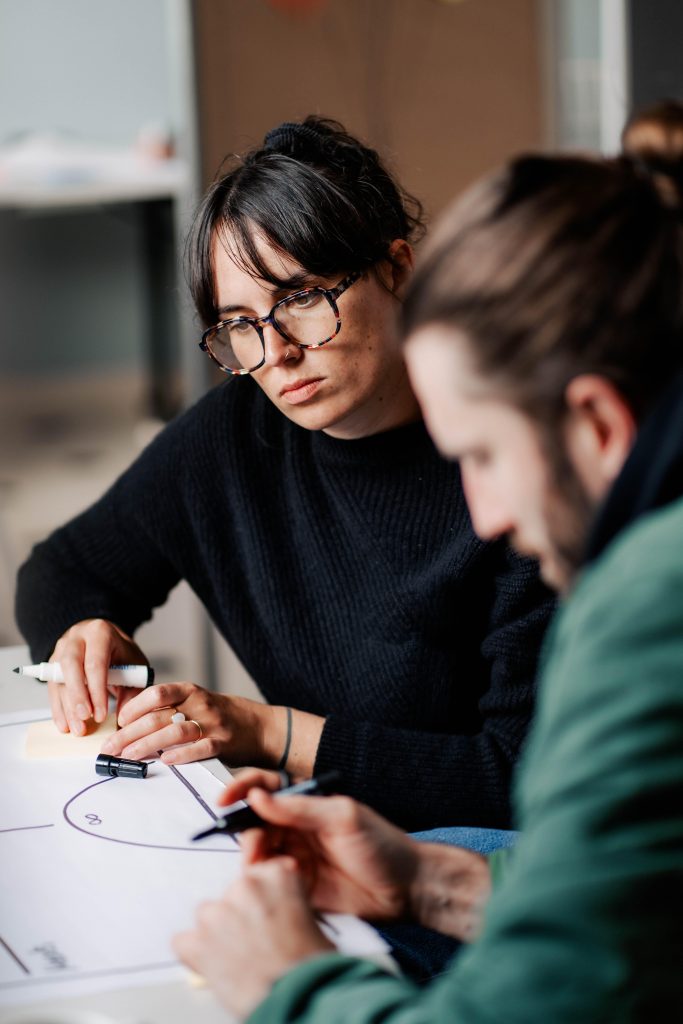Many people in Europe are under-represented by their supposedly representative institutions. We have to rebuild a political culture that serves all of us
The mention of ‘political funding’ often provokes a blend of curiosity and scepticism among people and organisations in philanthropic Europe. But a growing community of actors is trying a new approach to funding political work. By challenging the barriers philanthropy has erected around political funding, they are supporting initiatives to fix the many dysfunctions of our political systems, including the harmful consequences of unequal distribution of power.
It does not take a political scientist to realise that democracy in Europe is not at its best. There are many reasons why this is so, but one that keeps cropping up in most analyses is mistrust.

Multitudes grantee Fantapolitica! in Italy supports a network of young local councillors. Credit: Fantapolitica!
According to Standard Eurobarometer 98, 75 per cent of Europeans do not trust political parties, and only 33 per cent trust their national parliaments. This suspicion has multiple reasons, from strategically orchestrated disinformation campaigns to corruption scandals at national and European level and increasing levels of inequality and precariousness. Whatever the reason, the idea that politics does not change people’s lives for the better is widespread and growing. We believe the lack of diversity of perspectives in our political leadership is at the root of this worrying trend.
Hundreds of thousands of people are actively leading and mobilising their communities around diverse issues. Yet, they remain inadequately represented in the political arena.
Women are still under-represented in political decision-making at local, national and European levels. The percentage of women Members of the European Parliament (MEPs) is 39.5. There are also more men than women in all national parliaments in the EU, and an average of 32.1 per cent of representatives in our regional assemblies are women.
Similarly, the European Network Against Racism has estimated that racial and ethnic minorities comprise at least 10 per cent of the European Union population but only up to 5 per cent of the total elected MEPs on the latest election lists. It stands to reason that this disparity is similar on a national level throughout Europe.
These disparities are also prevalent when considering age and income level. Two-thirds of the current 705 MEPs are between 41 and 60. Only 11 are under 30. Again, this is mirrored nationally. In the UK, the average age of MPs is 51, and only 3.2 per cent are under 30. In France, one of the countries where this situation changed the most in the last elections, the average age is still 48.5 years. Only 7 per cent of MPs in the UK have a working-class background, compared to 34 per cent of the population. In France, 60 per cent of elected deputies are executives or workers from highly qualified professions, though they only make up 10 per cent of French people.
The same is true when we examine the political representation of people with disabilities or people from the LGBTQ+ communities. Finding studies focused on the representation levels of these groups is not easy, which shows how overlooked they are when it comes to political leadership. Taking the UK as an example, only eight MPs have self-identified as disabled (1.23 per cent), while one in five working-age adults live with a disability.
Multiple groups of people – actually, the majority of people as a whole – are, therefore, not adequately represented in political leadership. Not only does this highlight a fundamental flaw in the current landscape of representative democracies in Europe, but it also indicates that crucial policies on pressing issues, from the climate crisis to surging inequality and the governance of technologies such as AI, are formulated without the perspectives of those most affected.
The result of this is a vicious cycle: ineffectiveness in policy-making, which lacks the diversity of perspectives, producing widespread disconnection from politics, which leads to distrust and, finally, to retreat among many segments of the population who stop believing in the capacity of politics to respond to their needs. This process is so deeply entrenched in our societies that it can only be broken through systemic interventions that require creativity and ambition.
Coming to power, staying in power
The above numbers are not the result of chance. They are another manifestation of systemic inequalities, producing barriers to coming to power and staying in power.
People from under-represented groups face numerous obstacles to accessing political power, which we identified clearly in our research before launching Multitudes. Two examples of these barriers that come up in the dozens of conversations we hold every month are a political culture in which racism, misogyny, ableism, xenophobia and queerphobia are still rife and a lack of access to knowledge and skills on crucial elements of the political process, such as how to manage the media, how to run an election campaign or how to build social movements that can support a particular political agenda in the long term.
Through our extensive experience in community organising and collaborating with activists, we know that, across Europe, hundreds of thousands of people are actively leading and mobilising their communities around diverse issues. Yet, they remain inadequately represented in the political arena. The questions that culminated in our roles as co-directors at Multitudes had been brewing for many years: how can we ensure that people who are under-represented in politics not only influence power from the outside but actually hold power in our political institutions? How can we transcend the adverse consequences of individualistic and tokenistic diversity-based approaches to political leadership and embrace a more substantial understanding of representation anchored in the experiences of those insufficiently represented?
We all agree that reimagining politics as more inclusive, human and hopeful is a must, not a nice-to-have.
While we do not have all the answers, our theory of change points to several necessary steps: we have to identify the leaders who can build projects and initiatives to fix the representation gap, and we have to connect these leaders so that they can help each other. In short, we have to support them so that they can better realise their mission, and this is where political philanthropy can help, focusing on everything that happens long before an electoral campaign and everything that happens afterwards because there is no point breaking down the barriers to political power without tackling the many obstacles to staying in power. We need new faces in our institutions and new practices when it comes to holding power.
We have identified other issues in our political systems that make politics less inclusive and, in turn, less effective: short-termism, the reign of competition over collaboration, the constant exhaustion of political leaders and their staff, the lack of access to knowledge about how to design, enact and implement public policies; and the pressure, harassment and violence to which many politicians – especially those from under-represented communities – are regularly subjected. Being in politics is very difficult if you are a woman: figures estimated by the Inter-Parliamentary Union show that 81.8 per cent of women parliamentarians in the world have experienced psychological violence, and 44.4 per cent of those surveyed have received death threats as well as rape, beatings or kidnapping threats during their mandate. Being in politics is even more difficult if you are a Black, PoC or Asian woman: according to a 2017 study by Amnesty International, Black, Asian, and PoC Minority Ethnic women MPs in the UK received 41 per cent of the Twitter hate messages analysed in the run-up to the 2017 general election, despite there being almost eight times as many white MPs in the study.
Political leadership is hard for most, but it’s barely endurable for some.
Political changemakers: a reason for hope
Fortunately, many political changemakers have identified the same barriers and are testing solutions to intervene in the system at different points and every corner of Europe. All of them make up what Professor Johanna Mair of the Hertie School in Berlin has characterised in her paper The Emerging Field of Political Innovation as ‘an ecosystem of political innovation that has begun to diagnose the problems of the political system and work collectively to find solutions to strengthen and revitalise democracy’.
The examples are countless, and we have defined three broad categories to centre our funding and support work:
1. Initiatives that prepare new political leaders to run for office, such as Brand New Bundestag and Join Politics in Germany, Tous Elus and the Académie des Futurs Leaders in France or Fantapolitica! in Italy.
2. Organisations working to find effective ways for people and communities to mobilise and build political power, such as Démocratiser la Politique, documenting the underrepresentation of working-class people in French politics and supporting their mobilisation towards realised representation in electoral and political spaces.
3. Initiatives aiming to build more inclusive and human political cultures, such as Glitch, an NGO committed to eradicating online abuse, which Seyi Akiwowo founded after her experience as a Black politician in the UK.
Despite their ambition and the demonstrated impact of their initiatives, these innovators are facing considerable obstacles to their mission, from the persistent scepticism of (some) funders to the difficulties of scaling their work in a continent with dozens of different codes of law and political systems, to a sense of loneliness and disconnection, to a lack of infrastructure to share good practices and lessons between similar initiatives, but also across countries.
The critical role of enablers
Multitudes Foundation was conceived to address these challenges by offering financial support for initiatives in different stages of their growth (ideation, incubation and scale), practical and strategic support and a community of practice for political changemakers to learn and strategise together. We are what Professor Mair calls an ‘enabler’, ‘groups of individuals and organisations inside the political innovation ecosystem trying to achieve social change through formal political change’.
We need many more enablers to explore this new and promising path towards political renewal. And we need them now.
The list of such enablers includes Luminate, Daniel Sachs Foundation, Democratie en Media and Robert Bosch Stiftung, who are funding our work. We all agree that reimagining politics as more inclusive, human and hopeful is a must, not a nice-to-have. Because no matter the field, systemic change will happen much faster with political leadership that can bring their experience and expertise to the table and the trust and support of their communities to advance ambitious policy agendas that meaningfully improve the lives of many.
The scale and urgency of the challenges require that this new ecosystem develop fast. Our political culture won’t transform instantly; it requires persistent, multi-year initiatives to bridge the European representation gap significantly, influencing policy-making and enhancing confidence in our political leaders.
In other words, we need many more enablers to explore this new and promising path towards political renewal. And we need them now. We need partners who will support candidates and political parties but also work to change ecosystems and political cultures; allies who will power existing efforts to build political influence but also new ones to build political power; and visionaries who are ready to stop treating representation in politics as a purely statistical indicator and start seeing it as the prerequisite to effective governance and a functioning democracy.
Sarah Durieux is co-director at Multitudes Foundation. email: sarah@wearemultitudes.org
X: @Sarah_Durieux
Jeff Kwasi Klein is co-director at Multitudes Foundation. email: jeff@wearemultitudes.org







Comments (0)
This article is very helpful stimulus to reflect on the relationship between philanthropy and politics in a context other than Europe. An African narrative on the relationship would start with the nature of politics in nation states that have been imposed on populations. A more or less universal outcome is neo-patrimonial political systems where gift-giving, be it formal or informal, tie political patrons to (voting) clients in sort of mutual dependency. These preconditions invite a critical, postcolonial perspective on how 'philanthropy' and politics interact in ways that can empower. A necessary work in progress.